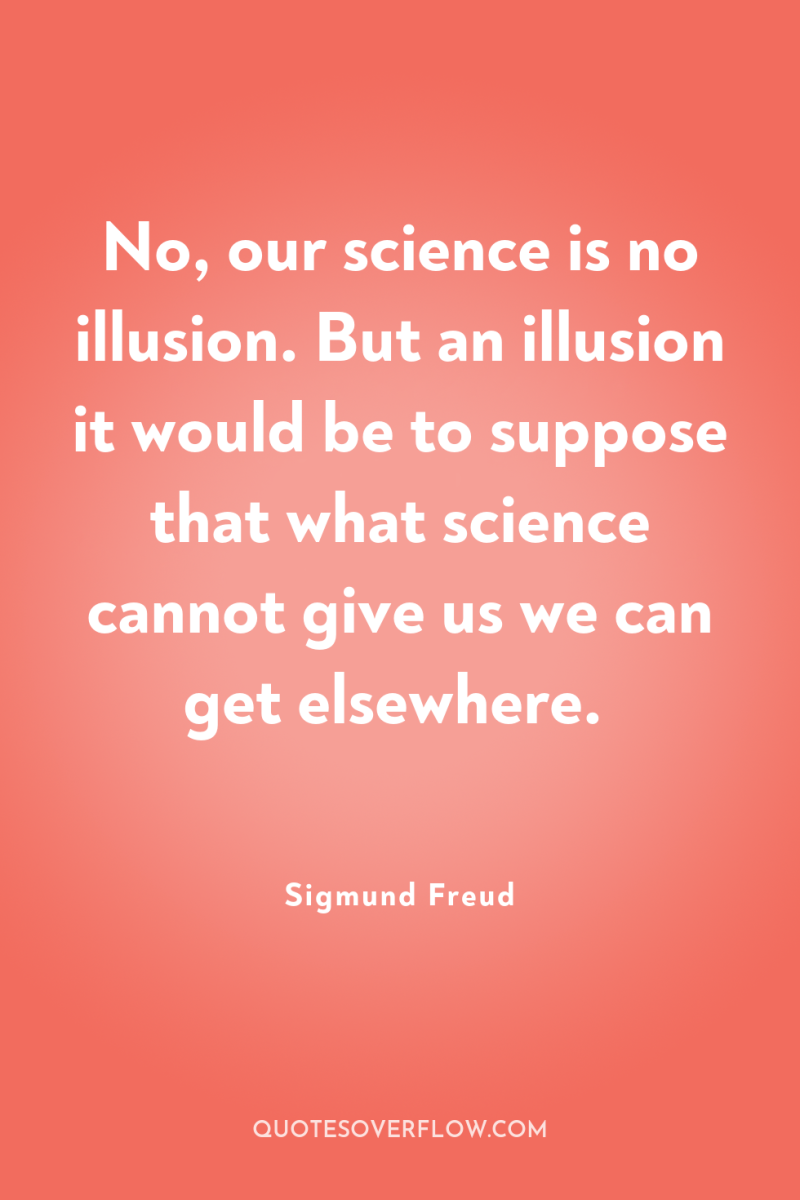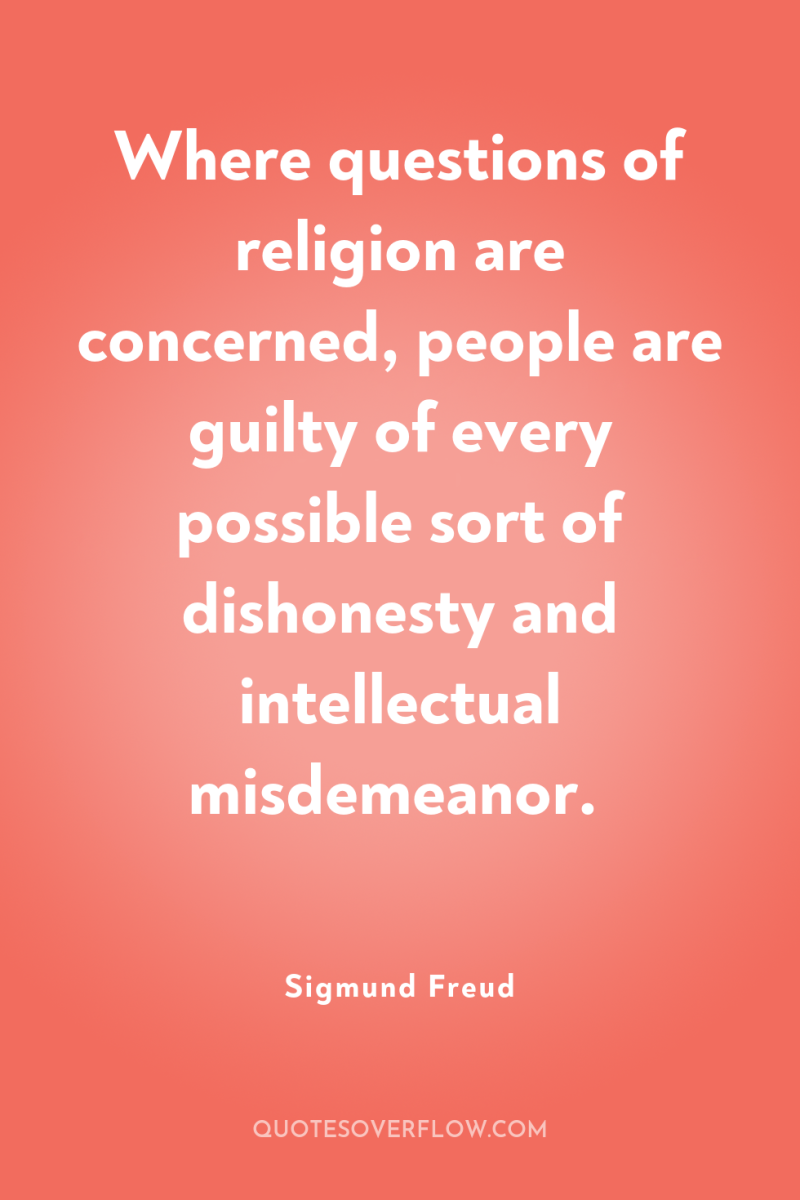
1
No, our science is no illusion. But an illusion it would be to suppose that what science cannot give us we can get elsewhere.Sigmund Freud
2
Religious doctrines … are all illusions, they do not admit of proof, and no one can be compelled to consider them as true or to believe in them.Sigmund Freud
3
Thus we arrive at the singular conclusion that of all the information passed by our cultural assets it is precisely the elements which might be of the greatest importance to us and which have the task of solving the riddles of the universe and of reconciling us to the sufferings of life -- it is precisely those elements that are the least well authenticated of any.Sigmund Freud

4
Where questions of religion are concerned, people are guilty of every possible sort of dishonesty and intellectual misdemeanor.Sigmund Freud
5
It would be very nice if there were a God who created the world and was a benevolent providence, and if there were a moral order in the universe and an after-life; but it is a very striking fact that all this is exactly as we are bound to wish it to be.Sigmund Freud
6
We believe that it is possible for scientific work to gain some knowledge about the reality of the world, by means of which we can increase out power and in accordance with which we can arrange our life. If this belief is an illusion, then we are in the same position as you. But science has given us evidence by its numerous and important successes that it is no illusion.Sigmund Freud
7
Perhaps the hopes I have confessed to are of an illusory nature, too. But I hold fast to one distinction. Apart from the fact that no penalty is imposed for not sharing them, my illusions are not, like religious ones, incapable of correction.Sigmund Freud
8
It would be an undoubted advantage if we were to leave God out altogether and honestly admit the purely human origin of all the regulations and precepts of civilization. Along with their pretended sanctity, these commandments and laws would lose their rigidity and unchangeableness as well. People could understand that they are made, not so much to rule them as, on the contrary, to serve their interests; and they would adopt a more friendly attitude to them, and instead of aiming at their abolition, would aim only at their improvement.Sigmund Freud
9
Observe the difference between your attitude to illusions and mine. You have to defend the religious illusion with all your might. If it becomes discredited - and indeed the threat to it is great enough - then your world collapses. There is nothing left for you but to despair of everything, of civilization and the future of mankind. From that bondage I am, we are, free. Since we are prepared to renounce a good part of our infantile wishes, we can bear it if a few of our expectations turn out to be illusions.Sigmund Freud
10
The voice of the intellect is soft one, but it does not rest until it has gained a hearing. Ultimately, after endless rebuffs, it succeeds. This is one of the few points in which one may be optimistic about the future of mankind.Sigmund Freud
11
If we turn to those restrictions that only apply to certain classes of society, we encounter a state of things which is glaringly obvious and has always been recognized. It is to be expected that the neglected classes will grudge the favoured ones their privileges and that they will do everything in their to power to rid themselves of their own surplus of privation. Where this is not possible a lasting measure of discontent will obtain within this culture, and this may lead to dangerous outbreaks. But if a culture has not got beyond the stage in which the satisfaction of one group of its members necessarily involves the suppression of another, perhaps the majority---and this is the case in all modern cultures, ---it is intelligible that these suppressed classes should develop an intense hostility to the culture; a culture, whose existence they make possible by their labour, but in whose resources they have too small a share. In such conditions one must not expect to find an internalization of the cultural prohibitions among the suppressed classes; indeed they are not even prepared to acknowledge these prohibitions, intent, as they are, on the destruction of the culture itself and perhaps even of the assumptions on which it rests. These classes are so manifestly hostile to culture that on that account the more latent hostility of the better provided social strata has been overlooked. It need not be said that a culture which leaves unsatisfied and drives to rebelliousness so large a number of its members neither has a prospect of continued existence, nor deserves it. .Sigmund Freud
12
Immorality, no less than morality, has at all times found support in religion.Sigmund Freud
13
Where the questions of religion are concerned people are guilty of every possible kind of insincerity and intellectual misdemeanor.Sigmund Freud
14
If you want to expel religion from our European civilization, you can only do it by means of another system of doctrines; and such a system would from the outset take over all the psychological characteristics of religion–the same sanctity, rigidity and intolerance, the same prohibition of thought–for its own defence. You have to have something of the kind in order to meet the requirements of education. And you cannot do without education.Sigmund Freud
15
Religion has clearly performed great services for human civilization. It has contributed much towards the taming of the asocial instincts. But not enough. It has ruled human society for many thousands of years and has had time to show what it can achieve. If it had succeeded in making the majority of mankind happy, in comforting them, in reconciling them to life and in making them into vehicles of civilization, no one would dream of attempting to alter the existing conditions. But what do we see instead? We see that an appallingly large number of people are dissatisfied with civilization and unhappy in it, and feel it as a yoke which must be shaken off; and that these people either do everything in their power to change that civilization, or else go so far in their hostility to it that they will have nothing to do with civilization or with a restriction of instinct. At this point it will be objected against us that this state of affairs is due to the very fact that religion has lost a part of its influence over human masses precisely because of the deplorable effect of the advances of science. We will note this admission and the reason given for it, and we shall make use of it later for our own purposes; but the objection itself has no force. It is doubtful whether men were in general happier at a time when religious doctrines held unrestricted sway; more moral they certainly were not. They have always known how to externalize the precepts of religion and thus to nullify their intentions. The priests, whose duty it was to ensure obedience to religion, met them half-way in this. God's kindness must lay a restraining hand on His justice. One sinned, and then one made a sacrifice or did penance and then one was free to sin once more. Russian introspectiveness has reached the pitch of concluding that sin is indispensable for the enjoyment of all the blessings of divine grace, so that, at bottom, sin is pleasing to God. It is no secret that the priests could only keep the masses submissive to religion by making such large concessions as these to the instinctual nature of man. Thus it was agreed: God alone is strong and good, man is weak and sinful. In every age immorality has found no less support in religion than morality has. If the achievements of religion in respect to man’s happiness, susceptibility to culture and moral control are no better than this, the question cannot but arise whether we are not overrating its necessity for mankind, and whether we do wisely in basing our cultural demands upon it.Sigmund Freud
16
At this point it may be objected: well, then, if even the crabbed sceptics admit that the statements of religion cannot be confuted by reason, why should not I believe in them, since they have so much on their side:Â tradition, the concurrence of mankind, and all the consolation they yield? Yes, why not? Just as no one can be forced into belief, so no one can be forced into unbelief. But do not deceive yourself into thinking that with such arguments you are following the path of correct reasoning. If ever there was a case of facile argument, this is one. Ignorance is ignorance; no right to believe anything is derived from it. .Sigmund Freud
17
One thus gets an impression that civilization is something which was imposed on a resisting majority by a minority which understood how to obtain possession of the means to power and coercion. It is, of course, natural to assume that these difficulties are not inherent in the nature or civilization itself but are determined by the imperfections of the cultural forms which have so far been developed. And in fact it is not difficult to indicate those defects. While mankind has made continual advances in its control over nature and may expect to make still greater ones, it is not possible to establish with certainty that a similar advance has been made in the management of human affairs; and probably at all periods, just as now once again, many people have asked themselves whether what little civilization has thus acquired is indeed worth defending at all. One would think that a re-ordering of human relations should be possible, which would remove the sources of dissatisfaction with civilization by renouncing coercion and the suppression of the instincts, so that, undisturbed by internal discord, men might devote themselves to the acquisition of wealth and its enjoyment. That would be a golden age, but it is questionable if such a state of affairs can be realized. It seems rather that every civilization must be built upon coercion and renunciation of instinct; it does not even seem certain that if coercion were to cease the majority of human beings would be prepared to undertake to perform the work necessary for acquiring new wealth. One has, I think, to reckon with the fact that there are present in all men destructive, and therefore anti-social and anti-cultural, trends and that in a great number of people these are strong enough to determine their behavior in human society.Sigmund Freud
18
In so doing, the idea forces itself upon him that religion is comparable to a childhood neurosis, and he is optimistic enough to suppose that mankind will surmount this neurotic phase, just as so many children grow out of their similar neurosis.Sigmund Freud